Puzzles offer a powerful way to reduce stress while boosting your brain power. When you engage in puzzle-solving, your mind focuses on the task at hand, diverting attention from worries. This activity triggers dopamine release, enhancing feelings of pleasure and reward. Whether you prefer jigsaw puzzles, crosswords, or Sudoku, each type provides unique benefits for your cognitive function. To maximize relaxation, create a cozy puzzle environment with soft lighting and comfortable seating. Practice mindfulness techniques while puzzling to deepen the stress-relief effects. Beyond stress reduction, regular puzzling can sharpen your problem-solving skills and even help maintain long-term brain health. Discover how this hobby can transform your daily routine.
The Science Behind Puzzles
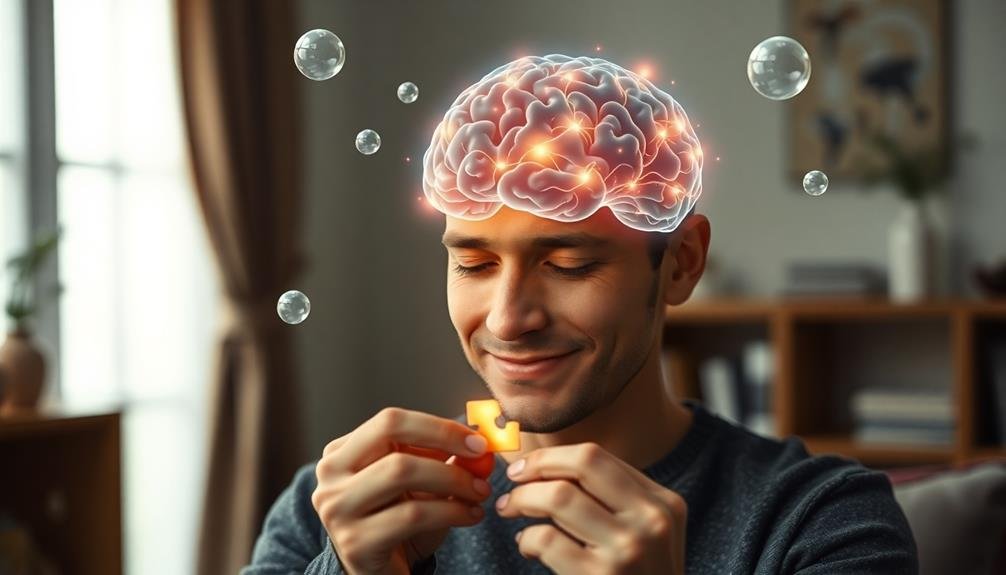
Three key factors contribute to puzzles' stress-relieving effects. First, they engage your brain in a focused activity, diverting attention from stressors. When you're absorbed in solving a puzzle, your mind can't dwell on worries or anxieties.
Second, puzzles trigger the release of dopamine, a neurotransmitter associated with pleasure and reward. Each time you fit a piece or solve a clue, you get a small dopamine boost, creating a positive feedback loop.
Third, puzzles promote a state of flow, where you're fully immersed in the task at hand. This state reduces stress hormones like cortisol and increases alpha brain waves, associated with relaxation.
Additionally, puzzles enhance cognitive function, improving memory, problem-solving skills, and spatial reasoning. They can even slow cognitive decline in older adults.
Different types of puzzles offer varied benefits. Jigsaw puzzles improve visual-spatial reasoning, while crosswords boost vocabulary and general knowledge.
Sudoku enhances logical thinking, and logic puzzles sharpen deductive reasoning. By regularly engaging in puzzle-solving, you're not just relieving stress but also giving your brain a thorough workout.
Choosing the Right Puzzle
Selecting the perfect puzzle for your stress relief journey depends on several factors. Consider your skill level, available time, and personal interests. If you're a beginner, start with simpler jigsaw puzzles or basic crosswords. As you progress, challenge yourself with more complex options like 3D puzzles or cryptic crosswords.
Think about the time you can dedicate to puzzling. Quick sudoku or word searches are great for short breaks, while larger jigsaw puzzles offer extended relaxation. Choose a puzzle that fits your schedule to avoid adding stress instead of relieving it.
Your interests play a significant role in puzzle selection. If you love art, opt for jigsaw puzzles featuring famous paintings. History buffs might enjoy historical-themed crosswords. Nature enthusiasts can find peace in landscape puzzles.
Consider the puzzle's physical attributes. Do you prefer tactile experiences? Try tangrams or wooden block puzzles. If you're more visually oriented, optical illusion puzzles might be your best bet.
Don't forget about digital options. Many puzzle apps offer a wide variety of brain teasers, allowing you to switch between different types easily. Experiment with various puzzles to find what works best for your stress relief needs.
Creating a Relaxing Puzzle Environment
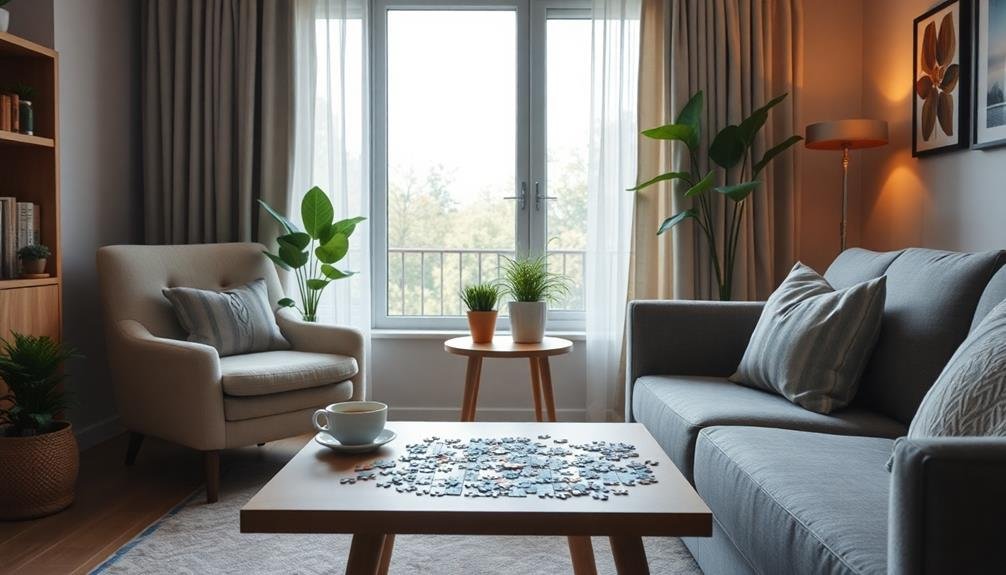
Often overlooked, your puzzle-solving environment plays an essential role in maximizing stress relief. To create an ideal space, consider the following elements:
- Lighting: Opt for soft, warm lighting that reduces eye strain
- Comfort: Choose a comfortable chair and table at the right height
- Noise level: Minimize distractions with quiet or calming background sounds
- Organization: Keep your puzzle supplies neatly arranged and easily accessible
Start by selecting a dedicated area in your home where you can leave your puzzle undisturbed. This allows you to return to it whenever you need a break, without the hassle of setting up each time.
Guarantee your space has good ventilation and a pleasant temperature to keep you focused and relaxed.
Consider adding personal touches that enhance your comfort and enjoyment. This might include a cozy blanket, your favorite mug for tea or coffee, or even a small plant to bring life to your puzzle corner.
Don't forget to keep your phone on silent or in another room to avoid interruptions. By crafting a tranquil environment, you'll create a sanctuary where you can fully immerse yourself in the puzzle-solving experience and reap its stress-relieving benefits.
Mindfulness Techniques While Puzzling
Incorporating mindfulness techniques into your puzzling routine can greatly enhance its stress-relieving benefits. As you sit down to work on your puzzle, take a moment to focus on your breath. Inhale deeply and exhale slowly, allowing tension to leave your body. Notice the weight of the puzzle piece in your hand, its texture, and the subtle variations in color.
As you search for matching pieces, practice being fully present in the moment. Avoid letting your mind wander to work or personal concerns. Instead, concentrate on the shapes and patterns before you. When you successfully connect pieces, savor the small sense of accomplishment.
Listen to the soft sound of pieces clicking together or sliding across the table. These auditory cues can serve as anchors for your attention. If you find your thoughts drifting, gently guide your focus back to the puzzle without judgment.
Try incorporating a brief body scan while puzzling. Start at your toes and work your way up, noticing any areas of tension. As you identify tight muscles, consciously relax them. This practice can help you maintain a relaxed posture and prevent physical strain during longer puzzling sessions.
Benefits Beyond Stress Relief
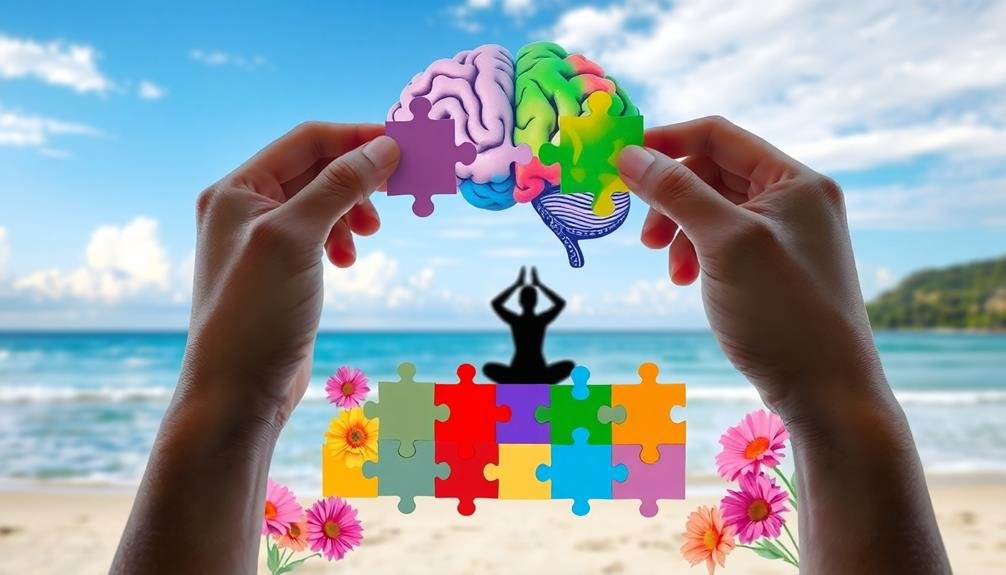
Beyond its stress-relieving properties, puzzling offers a wealth of additional benefits that can enhance your overall well-being. As you engage in this hobby, you'll find that it sharpens your cognitive skills, improves your problem-solving abilities, and boosts your memory.
Regular puzzling can even help maintain brain health as you age, potentially reducing the risk of cognitive decline.
Puzzling isn't just a solitary activity; it can also strengthen your social bonds. Whether you're working on a jigsaw puzzle with family or joining a crossword club, you'll create opportunities for meaningful connections and shared experiences.
Additionally, completing puzzles provides a sense of accomplishment, boosting your self-esteem and motivation.
Consider these unexpected benefits of puzzling:
- Enhances visual-spatial reasoning
- Improves hand-eye coordination
- Increases attention to detail
- Promotes a growth mindset
Frequently Asked Questions
Can Puzzling Become Addictive or Interfere With Daily Responsibilities?
You can become engrossed in puzzling, potentially leading to addiction-like behavior. It might interfere with your daily responsibilities if you're not careful. Set time limits and prioritize tasks to maintain a healthy balance in your life.
Are Digital Puzzles as Effective for Stress Relief as Physical Ones?
You'll find digital puzzles can be just as effective as physical ones for stress relief. They're convenient and offer variety, but you might miss the tactile experience. Both can engage your mind and help you unwind.
How Can I Incorporate Puzzling Into a Busy Work Schedule?
You can fit puzzling into your busy work schedule by keeping a small puzzle book or app handy. Take short breaks to solve a few puzzles, or try puzzle-solving during lunch. It's a great way to reset your mind.
What Are Some Social Puzzling Activities for Stress Relief With Friends?
You can organize puzzle nights with friends, join local puzzle clubs, or participate in team-based escape rooms. Try cooperative jigsaw puzzles, group crossword challenges, or multiplayer logic games. These activities promote social bonding while reducing stress through shared problem-solving.
Can Puzzling Help With Other Mental Health Issues Besides Stress?
Yes, puzzling can help with various mental health issues. You'll find it beneficial for anxiety, depression, and cognitive decline. It improves focus, boosts self-esteem, and provides a sense of accomplishment. It's also great for mindfulness and social connection.
In Summary
You've discovered a powerful tool for relaxation in puzzles. They're not just a fun pastime; they're a gateway to mindfulness and stress relief. Remember, there's no one-size-fits-all approach. Experiment with different types, create your ideal puzzling space, and practice mindfulness as you work. You'll soon find that puzzles offer benefits far beyond mere entertainment. So, pick up a puzzle and start your journey to a calmer, more focused you.

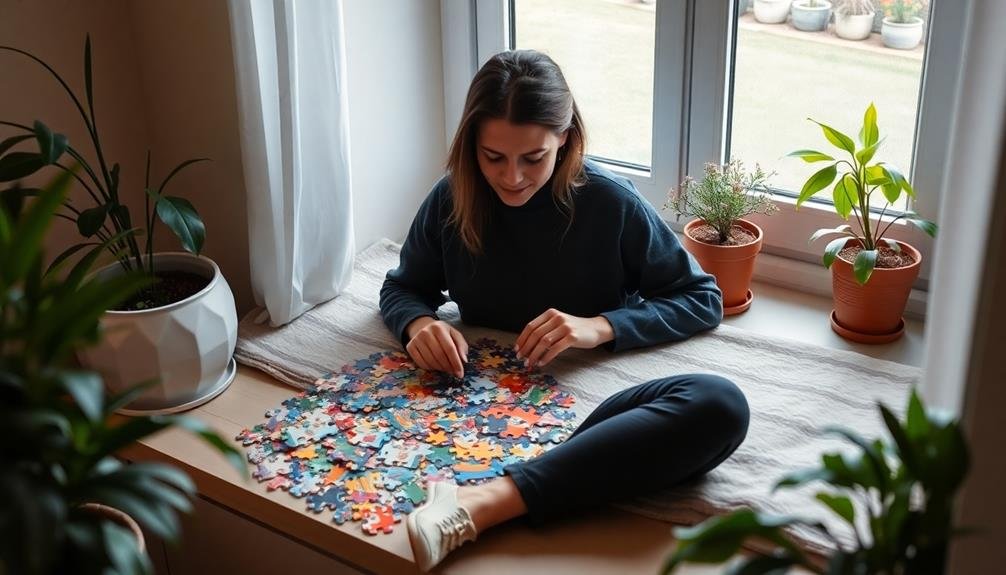
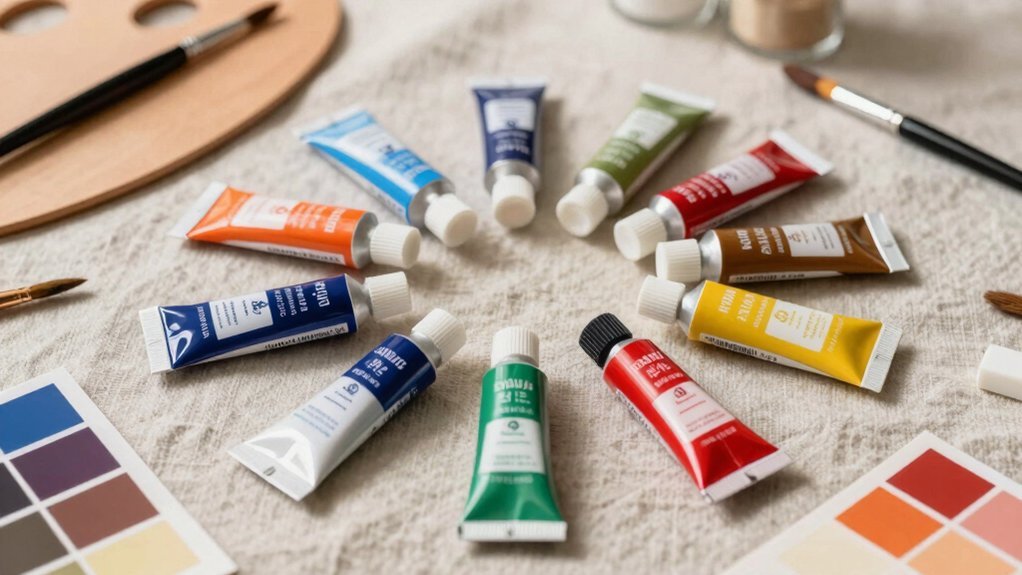
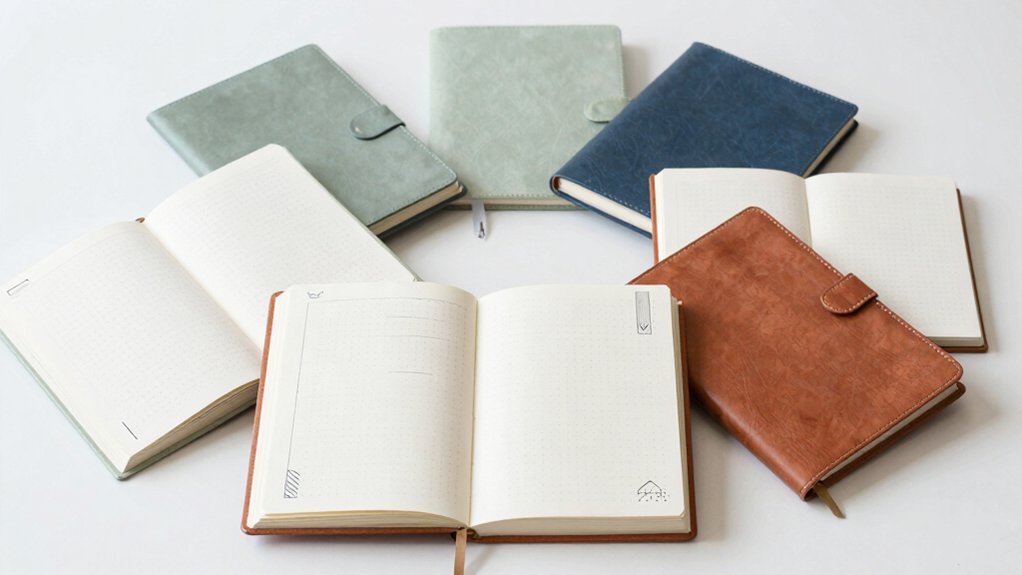
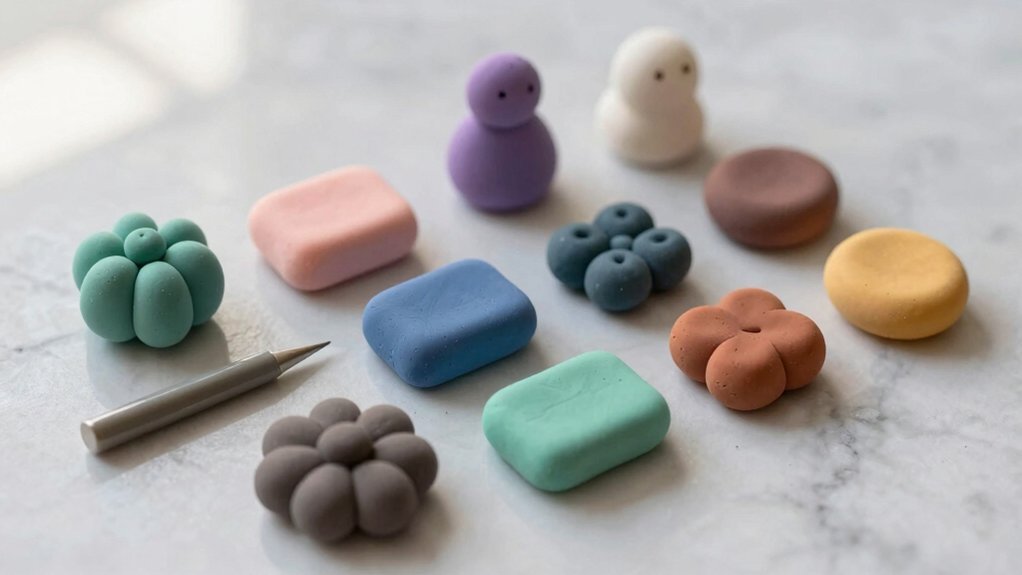
Leave a Reply